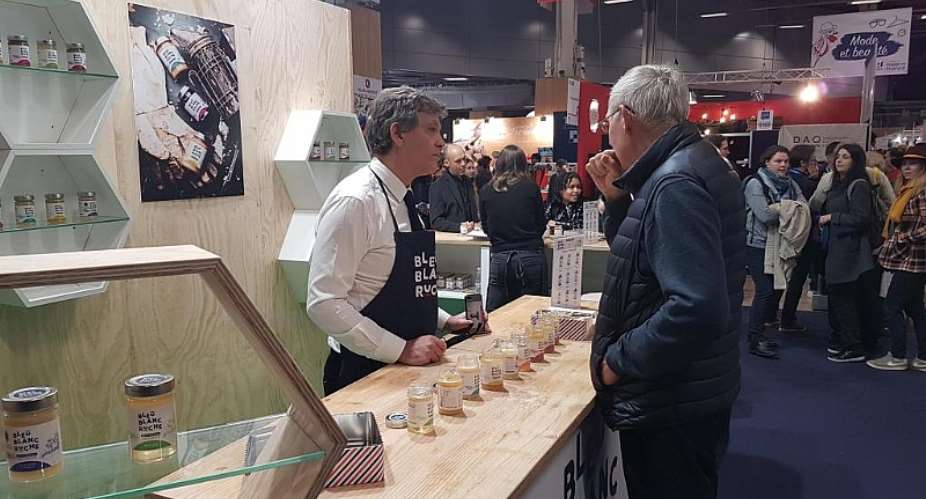Consumers in France are increasingly buying local, as this week's "Made in France" fair, which attracted nearly 80,000 visitors, shows. When the fair first launched in 2012, former Economy Minister Arnaud Montebourg boasted that it would boost the economy and create much-needed jobs. But nearly ten years on, the economic impact remains hard to gauge.
It was seven years ago that France's former firebrand minister Arnaud Montebourg donned a sailor's shirt and blender to pose on the front cover of daily Le Parisien, to sell the virtues of products "Made in France".
The ex-economy minister strongly believed that buying locally produced goods would stimulate the French economy and bring much-needed jobs.
But nearly ten years on, the minister has long gone, swapping the comfort of the finance ministry for a life making honey. And while Montebourg may have encouraged more people to buy in France, this sustained campaign has yet to show results.
"I didn't think when the argument was launched that it was correct," Lionel Fontagné, a professor at the Paris School of Economics, said.
While the local label drew in crowds of nearly 80,000 people to this year's "Made in France" fair, Fontagné argues "There is still no serious study that documents the impact of this salon," he told RFI.
No monopoly
For some, the “local” label is becoming a stronger buying criterion than “organic” and Fontagné acknowledges that it has had an impact on the "behaviour of consumers".
However, this proud stamp disguises the interconnectedness of French markets to the rest of the world.
"Products are made worldwide and not in any single country," says the economics professor.
"It's difficult to imagine that a given product produced or assembled in France would be based only on intermediate consumptions like services and components. Most of the cases, what happens is that you import in order to produce in France."
In essence, "fifty percent of the value added to local products are French and the other half is imported," Fontagné says, although maintains the "Made in France" logo is accurate.
Blue, White, Honey
If it is still too early to say whether brands bearing the colours of the tricolor flag have boosted the economy, the luxury market is showing some positive signs.
"High-quality products like handbags are doing very well and this is creating jobs in France," comments Fontagné.
The trouble is "this is not necessarily what French people can afford to purchase and so this gets exported," he said.
In the meantime, ex-economy minister Montebourg continues to defend the virtues of buying local, albeit in a new capacity as a honey producer.
His company "Bleu, Blanc, Ruche," (Blue, White, Honey) promises consumers 100 percent pure honey, the profits of which go towards saving bees.
More than a label
"Last year, our 45 beekepers, from whom we purchased 94 tons of honey at 18 times the market price, built 2,700 extra beehives. That's around 160 million bees," he told RFI.
Recent research shows that Europe has 13.4 million too few honeybee colonies to properly pollinate its crops.
"It's a start, but we have a lot of work to do," promised the ex-politician turned boss, for whom the label "Made in France" is more than just a business gimmick but a "social movement."





 Whoever participated in the plunder of the state must be held accountable – Jane...
Whoever participated in the plunder of the state must be held accountable – Jane...
 A vote for John and Jane is a vote to pull Ghana from the precipice of destructi...
A vote for John and Jane is a vote to pull Ghana from the precipice of destructi...
 I’ll repay your abiding confidence with loyalty, understanding and a devotion to...
I’ll repay your abiding confidence with loyalty, understanding and a devotion to...
 ‘I’ve learnt deeply useful lessons for the future' — Serwaa Amihere breaks silen...
‘I’ve learnt deeply useful lessons for the future' — Serwaa Amihere breaks silen...
 I’m sorry for the embarrassment – Serwaa Amihere apologises for leaked sex video
I’m sorry for the embarrassment – Serwaa Amihere apologises for leaked sex video
 Dumsor: Matthew Opoku Prempeh not in charge of Energy sector – Minority
Dumsor: Matthew Opoku Prempeh not in charge of Energy sector – Minority
 Adu Boahen’s murder: Police arrest house help who was in possession of deceased’...
Adu Boahen’s murder: Police arrest house help who was in possession of deceased’...
 Akufo-Addo nominates Felicia Attipoe as Tema West MCE
Akufo-Addo nominates Felicia Attipoe as Tema West MCE
 Election 2024: I can't have someone I defeated twice as my successor – Akufo-Add...
Election 2024: I can't have someone I defeated twice as my successor – Akufo-Add...
